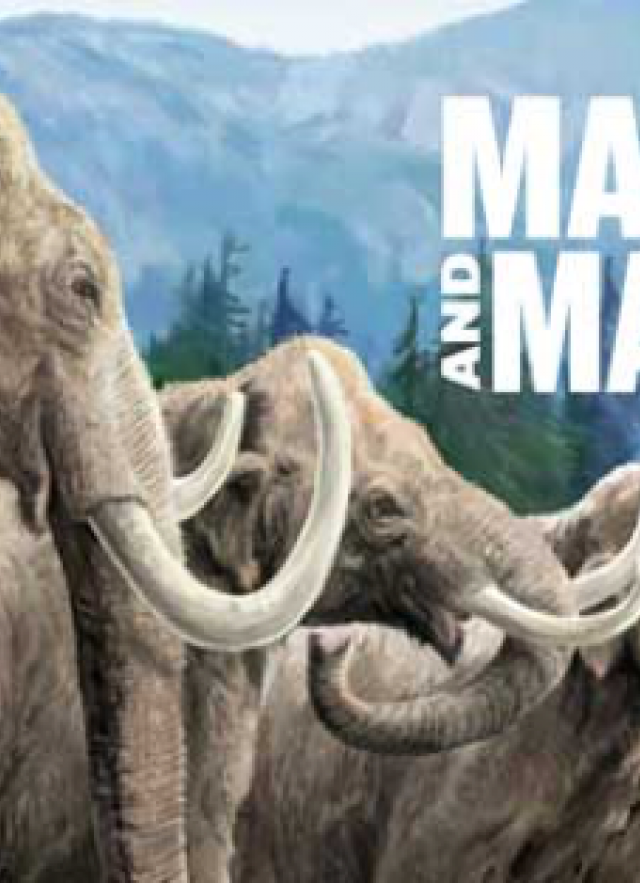Los Angeles, CA, December 20, 2018 – For the first time since the museum at La Brea Tar Pits opened in 1977, the visitor experience will change significantly, becoming more interactive and “hands-on” with new life-sized animal models and a range of touchable activities. On view starting December 21, 2018, Mammoths and Mastodons: At La Brea Tar Pits will feature highlights from a touring exhibition created by Chicago’s Field Museum that spotlight extraordinary Ice Age giants found both at L.A.’s iconic Tar Pits and around the world. The accompanying 3D film Titans of the Ice Age plays in the Tar Pits Theater.
These new components will be interspersed among the real Ice Age fossils currently in the museum galleries and will offer a deeper understanding of mammoths and mastodons and the rest of their fascinating family tree, including early relatives and one modern-day relation—the elephant. Visitors will encounter a colossal 13-foot Columbian mammoth and several new 3D replicas will loom as large as they did in the Ice Age on the museum’s floor. The surrounding interactive stations explore what these animals ate, what their habitats were like, and how they moved and behaved.
“This is an exciting update to the way we tell global stories through a local lens at La Brea Tar Pits,” said Dr. Lori Bettison-Varga, President and Director of the Natural History Museums of Los Angeles County, of which the museum at the Tar Pits is a part. “The Mammoths and Mastodons experience brings these animals to life. It’s fun and interactive, and because visitors will be able to touch and interact with nearly all the exhibits, we have a new opportunity to engage them to make connections between Ice Age Los Angeles, the Tar Pits today, and what both tell us about present-day ecological change.”
Mammoths and Mastodons looks into the world of titans that lived across Asia, Africa, Europe, and more locally in North America, including the L.A. Basin and Channel Islands, before they disappeared thousands of years ago. A new gallery focuses on the family to which mammoths and mastodons belong, and features animals ranging from a juvenile bull-sized mammal from 35 million years ago to a replica of Lyuba, the famed baby woolly mammoth found in Siberia in 2007, to modern day elephants.
The exhibition also features several hands-on stations and installations. For example, visitors can experience the dynamics of a mechanical trunk and experiment with grabbing objects. They’ll feel what it’s like to balance two large tusks, and see how a big ligament helps keep a mammoth’s skull level. Visitors can even challenge their friends to a round of mammoth tusk jousting—getting a sense of what it was like for two adult male mammoths to battle it out. Mammoths and Mastodons was created by the Field Museum, Chicago. The Los Angeles presentation is made possible by Judy and Ron Perlstein. Mammoths and Mastodons: At La Brea Tar Pits will be up for approximately one year, and is included in the price of general museum admission.
Titans of the Ice Age 3D In daily screenings of this 3D film, journey to a world lost in time, buried in ice, and ruled by giants! Encounter some of the Earth’s most awe-inspiring mammals, from saber-toothed cats and dire wolves to giant sloths and the iconic mammoths that lived 10,000 years before modern civilization. See how these magnificent creatures became trapped at the Tar Pits, preserved in time, and are being unearthed today. 3D films are free for Members, $5 for adults, seniors, students.
About the Natural History Museums of Los Angeles County The Natural History Museums of Los Angeles County (NHMLAC) include the Natural History Museum in Exposition Park (NHM), the La Brea Tar Pits, and the William S. Hart Museum. They operate under the collective vision to inspire wonder, discovery, and responsibility for our natural and cultural worlds. The museums hold one of the world’s most extensive and valuable collections of natural and cultural history—more than 35 million objects. Using these collections for groundbreaking scientific and historic research, the museum also incorporates them into on- and offsite nature and culture exploration in L.A. neighborhoods, and a slate of community science programs—creating a new natural history museum experience that explores the past, but increasingly addresses the present and the future.
About La Brea Tar Pits The asphalt seeps at La Brea Tar Pits are the only consistently-active and urban Ice Age excavation site in the world. This makes the site a unique window into to active—where fossils are discovered, prepared, researched, and displayed in one place. Outside, visitors can watch excavators unearth fossils of the wildlife trapped in the seeps. Inside the Museum, scientists and volunteers clean, repair, and identify those very fossils. The best specimens are displayed and available for research: from extraordinary saber-toothed cats, giant sloths, dire wolves, mammoths, and mastodons—to microfossils of rodents and plants. These fossils paint a picture of what life was like in the Los Angeles Basin between 50,000 and 10,000 years ago—a world both foreign and familiar to our own.
5801 Wilshire Boulevard, Los Angeles, CA, 90036. Open seven days a week from 9:30 a.m. to 5 p.m. $15 for adults; $12 for college students with ID and seniors 62+; $12 for youth 13-17; $7 for children 3-12. Admission is free for children 2 and under, Museum members and active military personnel and families; and free for L.A. County residents Monday-Friday, 3-5 pm. For further information, visit the Museum’s website at www.tarpits.org or call (323) 934-PAGE.
